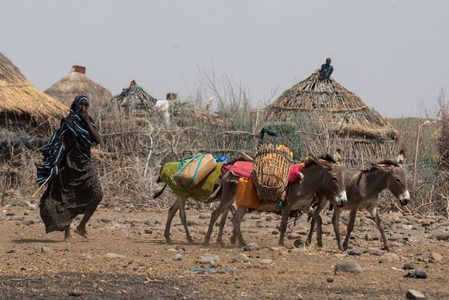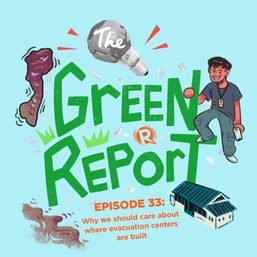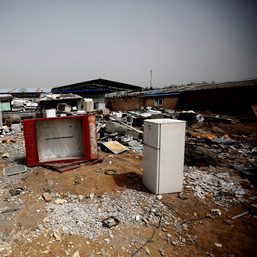SUMMARY
This is AI generated summarization, which may have errors. For context, always refer to the full article.
![[OPINION] The climate and environment agenda: 2022 in review](https://www.rappler.com/tachyon/2022/12/imho-2022agenda.jpg)
The green agenda will always be one of the most important issues that need to be monitored and addressed on any given day, month, or year. And 2022 was no different.
New leadership at the national and global levels provided hope for many countries and communities that actions to resolve climate and environmental issues would be scaled up. Instead, the past 12 months have provided the same old story to which we have become painfully familiar: a few steps forward, some steps backwards.
Translation: the rate of action remains way behind the rate of environmental decline.
Which green issues have defined 2022 and should be tracked next year?
Loss and damage (L&D)
Arguably the most critical outcome within the green agenda involves loss and damage, or climate-related risks and impacts beyond the capacities of nations and communities for adaptation and mitigation. At the most recent climate negotiations in Sharm El Sheikh, the most vulnerable countries (including the Philippines) achieved a victory decades in the making as an agreement was finally reached to create financing for addressing L&D.
The call for an L&D fund is based on the principles that polluters must pay, specifically that developed nations that benefited from the pollutive modes of development that caused the climate crisis must pay poorer countries that are suffering the most from its impacts.
Next year’s climate talks in Dubai would deliberate on how the L&D fund would be operationalized, including on sources of finance and how to disburse the money. Filipino negotiators must continue to influence these negotiations and represent the interests of one of the most vulnerable countries to the climate crisis.
Expect a push at the national level for not only strengthening the national position on avoiding and reducing L&D. Several groups would be lobbying for a bill that establishes a fund to compensate victims of climate-related disasters, to be partially sourced from penalties and taxes imposed on fossil fuel corporations operating in the Philippines.
Environmental rights
The aforementioned bill is partly based on the recommendation of the Commission on Human Rights in its landmark National Inquiry on Climate Change report that was released earlier last May. The seven-year investigation established that fossil fuel corporations can be held accountable and liable for their roles in burning fossil fuels that worsen the climate crisis, as well as misinforming the public about their actions in terms of violating human rights, especially the right to life.
The recognition by the United Nations of the human right to a “clean, healthy and sustainable environment” gives communities hardest hit by plastic pollution, the climate crisis, development aggression, and other harmful events more legal protection and grounds for potential litigation.
As part of its mandate, the Philippine government must enhance its current initiatives to protect the rights of indigenous peoples, youth, women, and the most vulnerable communities related to a healthy environment. This is especially important in a nation that remains one of the most dangerous in the world for environmental defenders, and has not done much in recent years to reverse this trend.
Energy security
The Russia-Ukraine conflict was primarily responsible for the rapid increase in fuel prices, which also contributed to inflation for many staple foods and other basic commodities in the Philippines. It further exposed our nation’s dependence on fossil fuels, especially coal whose importation in large amounts is a main factor for our electricity rates being one of the most expensive in the world.
This has spurred even more debates about how the Philippines must transition away from coal, which currently provides more than half of its power generation. The current presidency and its allies in Congress have begun presenting the narrative of natural gas, another fossil fuel that currently needs to be imported like coal, as a “bridging fuel” in the transition to cleaner energy sources. A few lawmakers have also favored the development of nuclear energy to replace coal as the main baseload energy source in the country.
Critics have labeled both energy sources as unnecessary detours towards the inevitable shift to renewable energy sources such as solar and wind. They cite as among their concerns the high initial costs for either option, which under the current energy policy framework can be passed on to Filipino consumers and trigger even more power hikes. Expect these debates to continue to next year and beyond, given the importance of energy security in national sustainable development.
Mining
Another controversial theme for 2022 involves the current Presidency actively promoting the growth of the country’s mining industry. Proponents have claimed economic development could further be spurred through realizing the potential of this sector, which contributes less than one percent to the nation’s gross domestic product.
However, local communities from Romblon to South Cotabato are vehemently opposing mining projects in their areas, referencing issues such as activities being conducted within ancestral domains and the lack of permits by mining companies for conducting operations. The recent cancellation of the business permit of a mining company in Tampakan, South Cotabato was noted by local activists as a victory after decades of struggle.
If the past 12 months are any indication (and they almost always are), expect 2023 to feature contentious debates, questionable decisions, and small triumphs in the green agenda. We expect that resolving these issues would not be easy, as stakeholders with conflicting interests collide.
Yet for the sake of our common home and everyone that lives and will live in it, we must hope that the new year would bring about some breakthroughs we need to protect ourselves against crises born from the ways of the “old normal.” As they say, old habits die hard. – Rappler.com
John Leo Algo is the Deputy Executive Director for Programs and Campaigns of Living Laudato Si’ Philippines and a member of the interim Secretariat of Aksyon Klima Pilipinas. He is a Filipino civil society delegate and speaker at COP27 in Sharm El Sheikh, Egypt, and a member of the Youth Advisory Group for Environmental and Climate Justice under the UNDP in Asia and the Pacific.
Add a comment
How does this make you feel?

![[OPINION] Fossil fuel debts are illegitimate and must be canceled](https://www.rappler.com/tachyon/2024/04/IMHO-fossil-fuel-debt-cancelled-April-16-2024.jpg?resize=257%2C257&crop_strategy=attention)
![[WATCH] John Kerry: You can’t solve climate crisis without addressing ocean’s challenges](https://www.rappler.com/tachyon/2023/12/cop28-united-states-john-kerry-december-2-2023-reuters-001.jpg?resize=257%2C257&crop_strategy=attention)



There are no comments yet. Add your comment to start the conversation.